The Classic

Fred Jacobs announced he has Parkinson’s in the same way he’s announced everything of consequence across a long, inventive career: plainly, without preamble, no tease for a later reveal after five minutes of spots for sports betting apps or cryptocurrency. It was Fred at his best, direct, unvarnished, and unwilling to pretend that candor requires theatrics. The news landed with the familiarity of a mentor once again pointing to the heart of the matter: here’s what you need to know, here’s what I’m doing about it.
It was the same pedagogy he once used to teach young broadcasters the intricacies of tape and turntables. Here’s a splicing block, a razor blade, and a Moody Blues track, see if you can make it better. A lesson in craft disguised as a challenge in curiosity. Fred, after all, has always been animated by the tension between data and instinct, by the question of how a well-placed song, a novel sequence of sounds, could hold a listener for just a little longer.
He came of age in Detroit at a moment when progressive radio was a messy, fertile experiment, a laboratory disguised as a marketplace. The city was large enough to matter, but still porous enough that a DJ with conviction could elevate a local B-side into national phenomenon. From this improvisational chaos Fred distilled order, birthing the Classic Rock format. Its endurance is proof of his insight: the Super Bowl commercial scored with Led Zeppelin riffs, the teenager who can recite Aerosmith lyrics decades after release, the playlists that still map our cultural memory.
And yet Fred has never succumbed to nostalgia. He understood earlier than most that formats calcify, that what is “unique” in one decade becomes the background noise of the next. His daily missives to the industry were reminders that the business was never about quarterly cash flow, but about human connection. The best jocks weren’t commodities; they were friends in the ether, their voices tying the day together as surely as the verses in any hit single. When consolidation stripped those voices in favor of balance sheets, Fred noted, gently but firmly, that something essential was being lost.
He adapted. He founded a consultancy with his brothers, brought his flock to CES to imagine the future, and made a practice of asking questions that nudged the industry past its blind spots. He was not content merely to observe; he wanted to see.
So, it is no surprise that his confrontation with Parkinson’s is framed not as tragedy, but as another invitation to engage. First, name the fear. Second, gather every shard of knowledge about it. Third, reinvent. Parkinson’s, in this light, is not an end to curiosity but a new context for it.
Fred has long argued that profit and ratings are effects, not causes. The cause is value, what can be created, added, shared today, and how it might expand tomorrow. That belief has been his quiet mantra, animating both the stations he shaped and the people he mentored. His disclosure, delivered with characteristic candor, is simply another iteration of that same philosophy: authenticity first, because that is where trust lives.
In this, Fred remains the quintessential broadcaster, not just a curator of music, but a model for how to live with honesty and imagination. Perhaps the most important lesson he teaches is not about splicing tape, not about audience research, not even about Classic Rock. It is this:
Confront change, with all its peril and possibility. Speaking it aloud, and then imagine what treasures can yet be created.
It’s Still Personal
 It began, as many radio stories do, with serendipity. A small family-run café tucked into an office park in Jacksonville, Florida, had chosen as its soundtrack not the predictable blandishments of streaming playlists, but Keener—our online reincarnation of our favorite Detroit radio legend. The Fresh From the Garden Cafe had been there for years, quietly accruing a clientele devoted less to novelty than to the steady comforts of continuity. Continue reading “It’s Still Personal” →
It began, as many radio stories do, with serendipity. A small family-run café tucked into an office park in Jacksonville, Florida, had chosen as its soundtrack not the predictable blandishments of streaming playlists, but Keener—our online reincarnation of our favorite Detroit radio legend. The Fresh From the Garden Cafe had been there for years, quietly accruing a clientele devoted less to novelty than to the steady comforts of continuity. Continue reading “It’s Still Personal” →
The Enduring Legacy of the Woodward Dream Cruise
 It begins, as it always does, with a sound. Not the cannon-crack of a dragster, but something subtler, more elemental: the low, syncopated murmur of a V8, felt as much in the rib cage as heard by the ear. On the Thursday before Dream Cruise weekend, it surfaces along Woodward Avenue like an old memory come to life. The engines idle at red lights in Ferndale, slip past the boutiques of Birmingham, hum over the rolling flats of Bloomfield Hills. They are apparitions in chrome and steel, longtail Buicks, shark-fin Chevrolets, candy-colored Mustangs, returning to the first paved mile in America for their yearly visitation. Continue reading “The Enduring Legacy of the Woodward Dream Cruise” →
It begins, as it always does, with a sound. Not the cannon-crack of a dragster, but something subtler, more elemental: the low, syncopated murmur of a V8, felt as much in the rib cage as heard by the ear. On the Thursday before Dream Cruise weekend, it surfaces along Woodward Avenue like an old memory come to life. The engines idle at red lights in Ferndale, slip past the boutiques of Birmingham, hum over the rolling flats of Bloomfield Hills. They are apparitions in chrome and steel, longtail Buicks, shark-fin Chevrolets, candy-colored Mustangs, returning to the first paved mile in America for their yearly visitation. Continue reading “The Enduring Legacy of the Woodward Dream Cruise” →
Home of the Hits

Hollywood has always thrived on spectacle. Its streets and hills are littered with architecture that wears its fantasies on its sleeve, Egyptian temples, Chinese pagodas, Spanish haciendas, all vying for attention beneath the unblinking California sun. Yet, among this feverish jumble of styles, one of the city’s most enduring landmarks is a model of restraint: a modest concrete-and-glass cylinder capped by a slender, needle-like spire.
For nearly seventy years, the Capitol Records Building at 1750 Vine Street has been as integral to Hollywood’s identity as the brass stars embedded in the sidewalk below. With the passing of its architect, Louis Naidorf, at ninety-six, we are reminded that even in a city built on grand illusions, some of its most lasting icons began as the work of an untested hand. Continue reading “Home of the Hits” →
You Were On My Mind
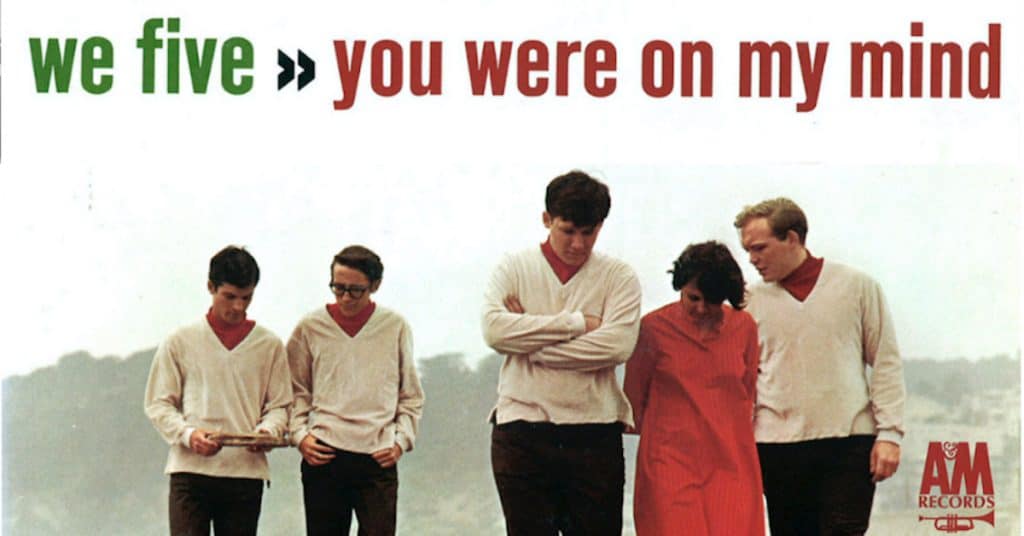
This week in 1965, amid the burgeoning folk revival and the first tentative stirrings of folk-rock, a band named The We Five emerged from San Francisco to claim a sudden and fleeting place in the pop landscape. Their single, “You Were On My Mind,” hit number one on the WKNR Music Guide. It would become both a defining anthem and an enduring enigma: a one-hit wonder whose resonance outlasted its creators’ brief moment in the spotlight.
The song itself was not originally theirs. It was written four years earlier by Sylvia Fricker, half of the Canadian duo Ian & Sylvia, in a modest hotel room in Greenwich Village, where the bathroom , ironically the only roach-free refuge , served as the incubator for what would become a quietly anguished meditation on memory and loss. Fricker’s lyrics, simple, spare, and suffused with a plaintive longing, caught the aching aftertaste of a heart half-broken, half-hopeful. Yet it was We Five’s interpretation that transformed the song into something altogether new: brighter, sharper, tinged with an electric edge that heralded a change in the musical winds. Continue reading “You Were On My Mind” →
The Quiet Orbit of Loni Anderson
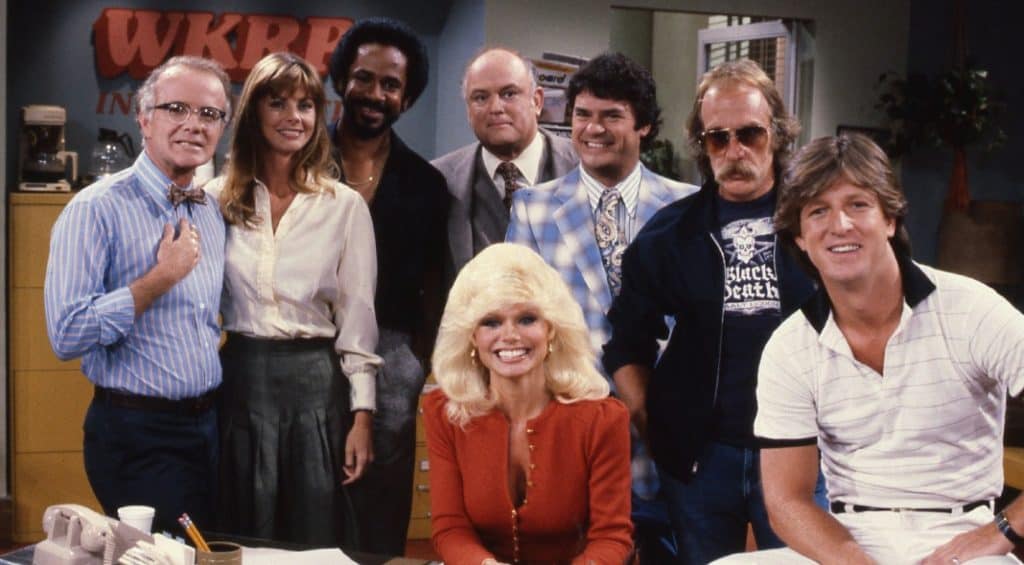 For those of us who grew up addicted to broadcast radio, with its open mics and closed-door politics, “WKRP in Cincinnati” offered both affection and satire. And in that sound booth of a sitcom, no one held the frequency quite like Loni Anderson, who left us this weekend at age 79. As Jennifer Marlowe, the station’s receptionist, gatekeeper, and quiet oracle, Loni brought an impeccable poise to the role, turning what might have been just another dumb blonde into a strategic triumph, a lesson in misdirection, elegance, and the sly power of feminine competence. Continue reading “The Quiet Orbit of Loni Anderson” →
For those of us who grew up addicted to broadcast radio, with its open mics and closed-door politics, “WKRP in Cincinnati” offered both affection and satire. And in that sound booth of a sitcom, no one held the frequency quite like Loni Anderson, who left us this weekend at age 79. As Jennifer Marlowe, the station’s receptionist, gatekeeper, and quiet oracle, Loni brought an impeccable poise to the role, turning what might have been just another dumb blonde into a strategic triumph, a lesson in misdirection, elegance, and the sly power of feminine competence. Continue reading “The Quiet Orbit of Loni Anderson” →
Ozzy Osbourne Courted Darkness and Outlived It
By the time we heard of Ozzy Osbourne’s passing at seventy-six, it felt less like the end of a life than the closing of a parable we’d been reading out loud for decades, unsure whether it was tragedy, farce, or miracle. His death on July 22nd was met with the kind of double take that only Ozzy could provoke: not he’s gone, but he wasn’t already? For most of his public existence, Osbourne seemed to teeter in a permanent twilight between collapse and comeback, a man whose biography was written in tabloid headlines and guitar feedback. That he lived as long as he did felt less like good fortune than a cosmic clerical error. Continue reading “Ozzy Osbourne Courted Darkness and Outlived It” →
The Unbearable Lightness of Being Ringo
 On the seventh of July, a Monday, amidst the unassuming hum of a world carrying on, Richard Starkey, saw his eighty-fifth year. The name he would later adopt—Ringo Starr—needs, of course, no introduction, yet it is the given name that feels more appropriate for the quietude of the occasion. If the Beatles were a singular, four-headed marvel of the twentieth century, then Ringo was its circulatory system—unshowy, indispensable, and possessed of a swing that was as intuitive as a heartbeat. Continue reading “The Unbearable Lightness of Being Ringo” →
On the seventh of July, a Monday, amidst the unassuming hum of a world carrying on, Richard Starkey, saw his eighty-fifth year. The name he would later adopt—Ringo Starr—needs, of course, no introduction, yet it is the given name that feels more appropriate for the quietude of the occasion. If the Beatles were a singular, four-headed marvel of the twentieth century, then Ringo was its circulatory system—unshowy, indispensable, and possessed of a swing that was as intuitive as a heartbeat. Continue reading “The Unbearable Lightness of Being Ringo” →
AT 40 at 55
On the Fourth of July weekend in 1970, America was still catching its breath from the cultural detonation of the previous decade. A new program came to life on just seven radio stations. “Here we go with the Top 40 hits of the nation this week on American Top 40,” the voice intoned. “The best-selling and most-played songs from the Atlantic to the Pacific, from Canada to Mexico.” It didn’t sound like revolution. It sounded like reassurance. Continue reading “AT 40 at 55” →
Bobby Sherman – A Quiet Finale
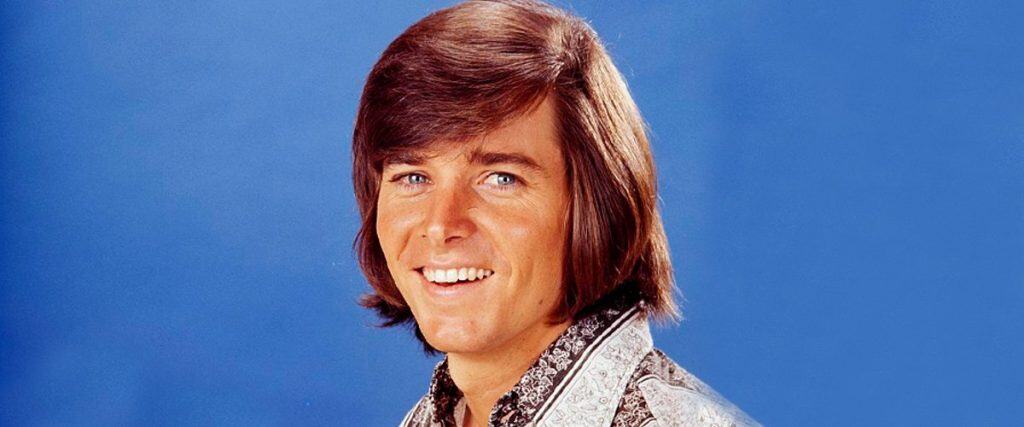
By June 24, 2025, the world had fallen silent—not with the frenzy that once trailed him, but with a gentle stillness. Bobby Sherman, the sweet-faced teen idol of the late 1960s, died at 81, his final days marked by the same modest grace that shaped his life. Continue reading “Bobby Sherman – A Quiet Finale” →
Lou Christie – The Voice That Pierced the Sky
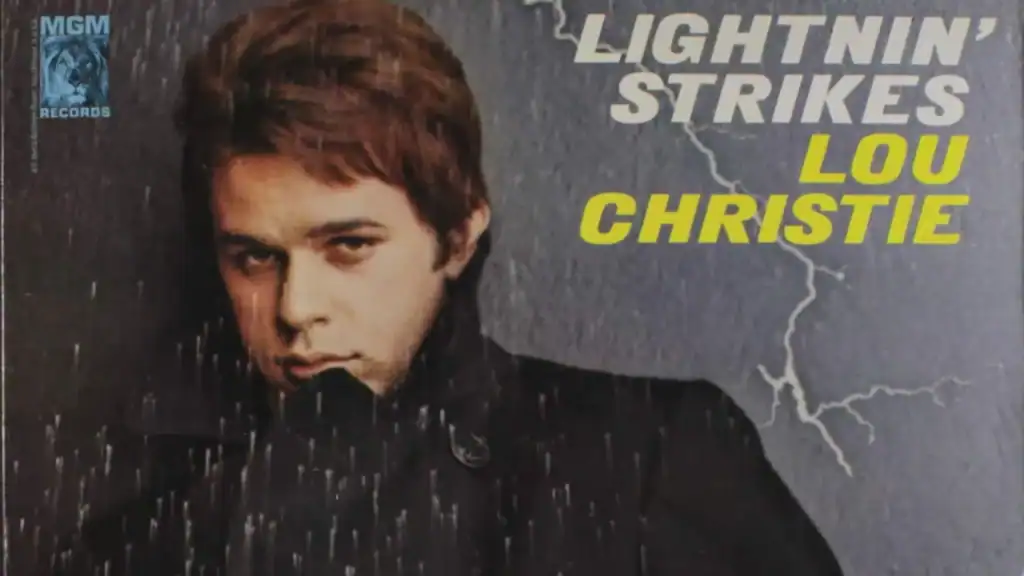 To hear a Lou Christie song on Keener for the first time was to experience something more than sound—a kind of pop exclamation mark hurled through a world of four-part harmonies and teenage platitudes. In a musical landscape dominated by the earnest chin-stroking of folk singers and the tight, syncopated machinery of Detroit’s Motown, Christie’s voice arrived like a lightning strike, cutting clean through the Keener airwaves. It was a helium-soaked, heaven-scraping falsetto that didn’t so much sing as spiral—vertiginous, improbable, and entirely unafraid of absurdity. It sounded less like a young man’s croon than the internal monologue of adolescence itself: dramatic, operatic, always on the verge of a glorious crack-up. Continue reading “Lou Christie – The Voice That Pierced the Sky” →
To hear a Lou Christie song on Keener for the first time was to experience something more than sound—a kind of pop exclamation mark hurled through a world of four-part harmonies and teenage platitudes. In a musical landscape dominated by the earnest chin-stroking of folk singers and the tight, syncopated machinery of Detroit’s Motown, Christie’s voice arrived like a lightning strike, cutting clean through the Keener airwaves. It was a helium-soaked, heaven-scraping falsetto that didn’t so much sing as spiral—vertiginous, improbable, and entirely unafraid of absurdity. It sounded less like a young man’s croon than the internal monologue of adolescence itself: dramatic, operatic, always on the verge of a glorious crack-up. Continue reading “Lou Christie – The Voice That Pierced the Sky” →
The Beatles’ EMI vs. Capitol Albums: How America Remixed the British Invasion
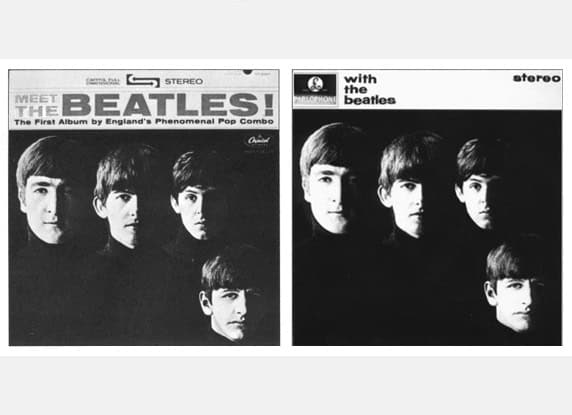 When Beatlemania exploded on Keener, it wasn’t just a cultural phenomenon, it was a marketing war. On one side of the Atlantic stood EMI’s Parlophone label, helmed by producer George Martin and engineer Geoff Emerick, who shaped the Beatles’ artistic journey with a balance of studio innovation and British sensibility. On the other, Capitol Records, EMI’s American subsidiary, played the hits game with a nose for profit. The result? Two Beatles discographies: one curated by the band and their producer, the other chopped, shuffled, and rebranded for U.S. ears.
When Beatlemania exploded on Keener, it wasn’t just a cultural phenomenon, it was a marketing war. On one side of the Atlantic stood EMI’s Parlophone label, helmed by producer George Martin and engineer Geoff Emerick, who shaped the Beatles’ artistic journey with a balance of studio innovation and British sensibility. On the other, Capitol Records, EMI’s American subsidiary, played the hits game with a nose for profit. The result? Two Beatles discographies: one curated by the band and their producer, the other chopped, shuffled, and rebranded for U.S. ears.
And those differences? They tell a deeper story about the transatlantic tug-of-war between artistry and commerce. Continue reading “The Beatles’ EMI vs. Capitol Albums: How America Remixed the British Invasion” →



